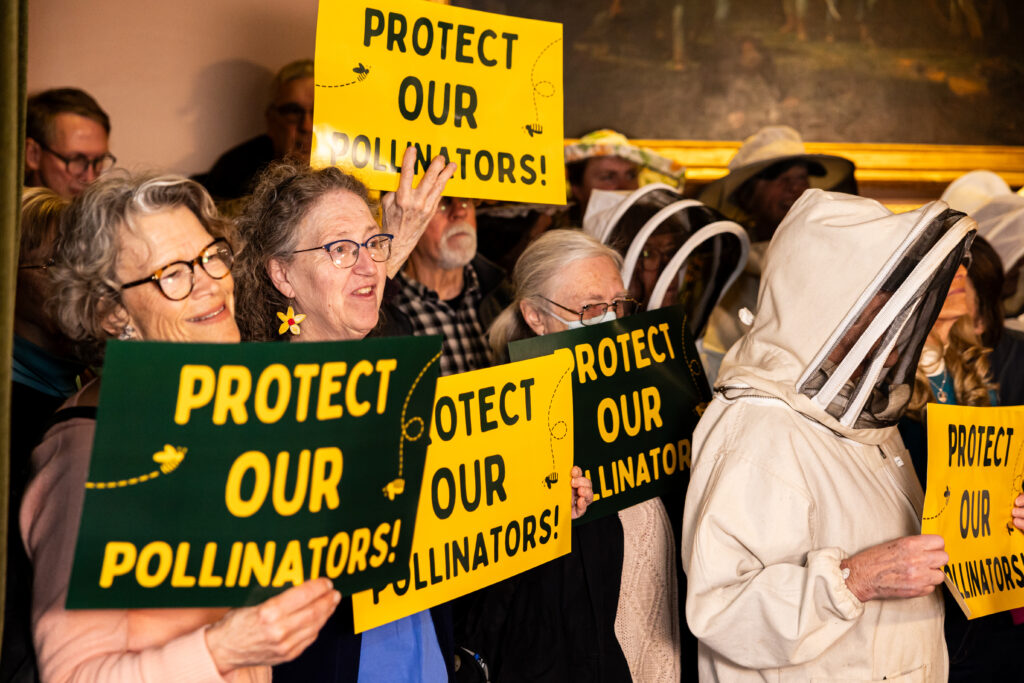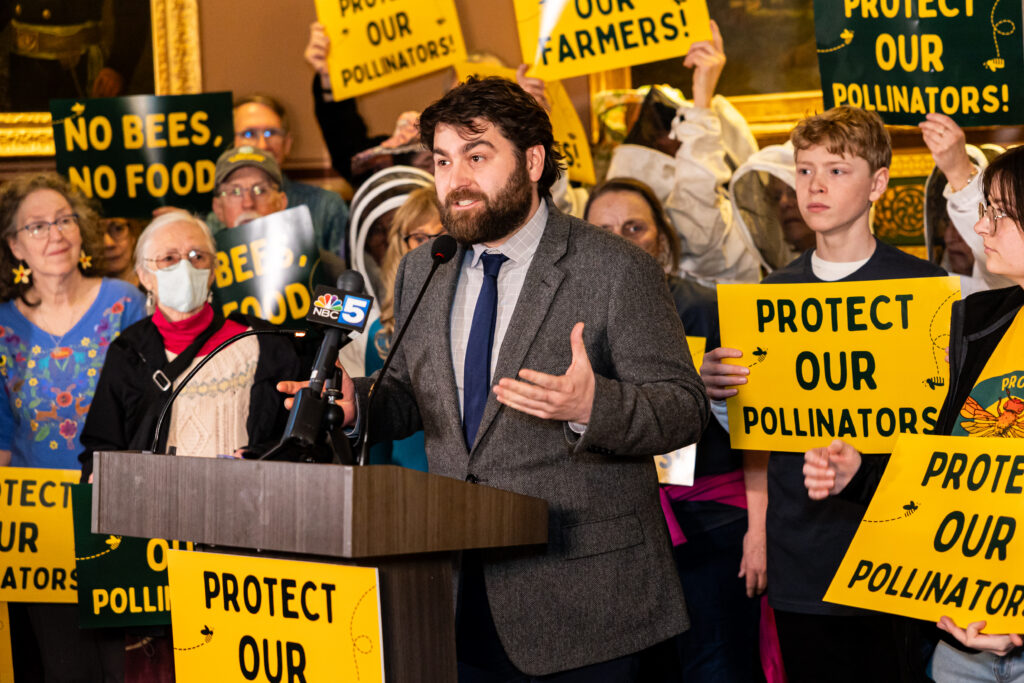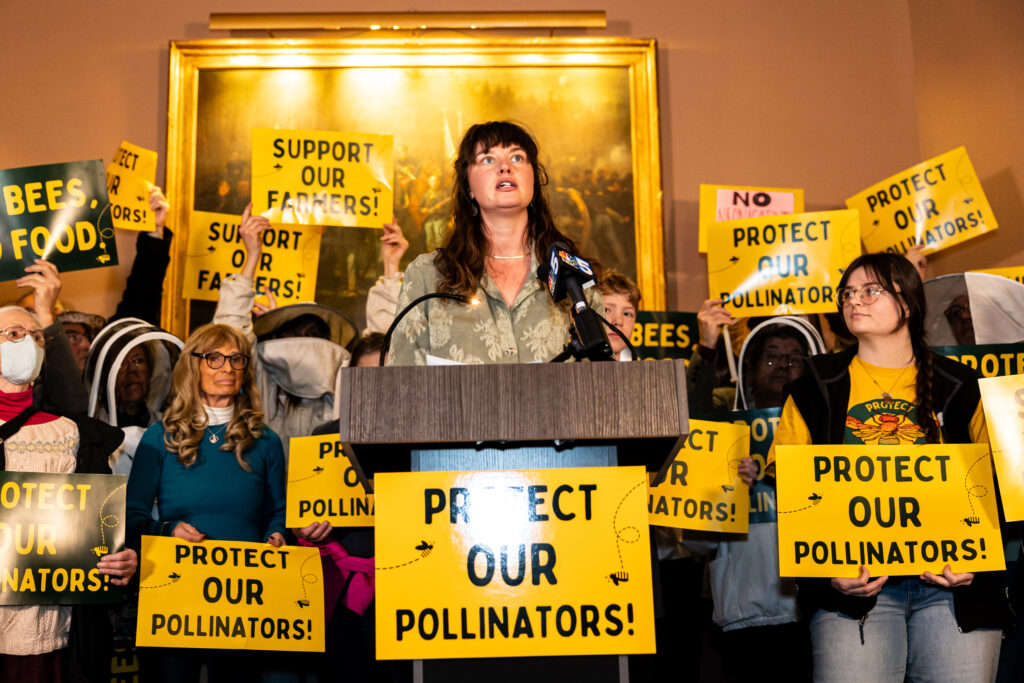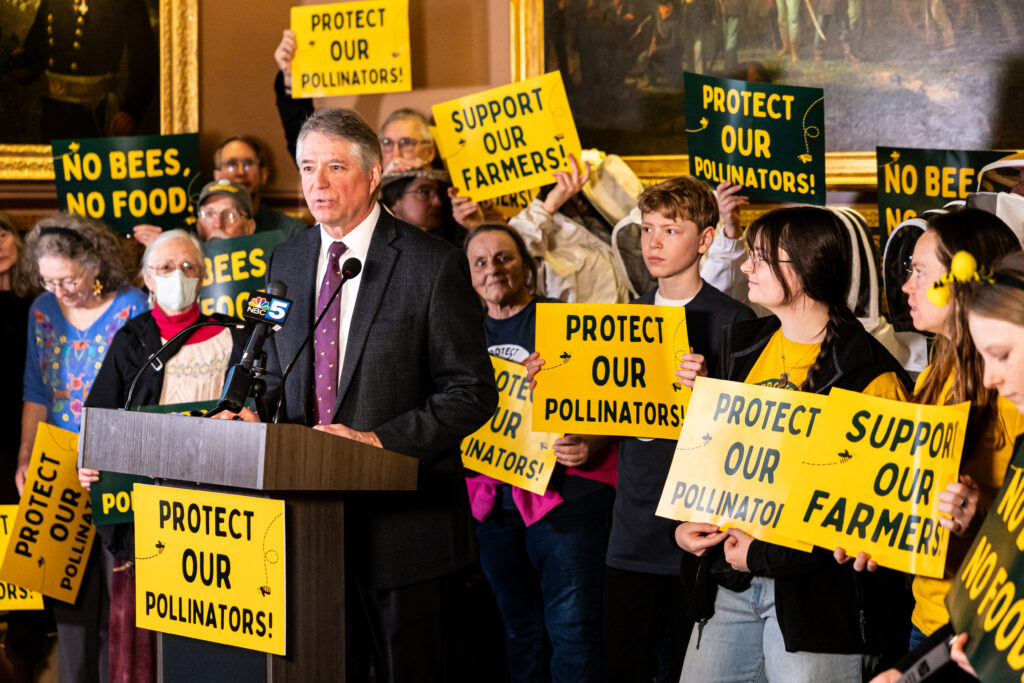Dozens of beekeepers, students, conservationists, environmental advocates, and pollinator enthusiasts of all sorts gathered at the State House to make the case for providing greater protections for bees and other pollinators. A key legislative committee took up the bill (H.706) with hopes of passing it, but at the end of the day the vote was postponed as some last-minute amendments to the bill required more time for consideration. A favorable vote in committee is still expected this week.

Less than one year ago, a new assessment by the U.S. Environmental Protection Agency (EPA) found that the three most commonly-used neonics likely jeopardize the continued existence of over 200 threatened and endangered species, including pollinators such as bees, dragonflies, and butterflies.
At the same time, researchers who have testified before the House Committee on Agriculture, Food Resiliency, and Forestry (“House Agriculture”) this year have noted that use of neonic-treated corn and soybean seeds seems to provide few if any benefits to farmers. Indeed, the loss of pollinators in the state due to exposure to neonics presents its own threat to Vermont’s agricultural economy.
“When pollinators are in trouble, our food system is in trouble,” said Representative Mike Rice, a member of the House Agriculture Committee and co-sponsor of the bill. “I believe deeply in Vermont’s farmers, who we must empower to feed our communities while practicing sound environmental stewardship. That’s why it’s time to pass H.706, which includes ample protections to ensure a just transition for our farmers while reining in the use of these pesticides that have wreaked havoc on our pollinators for too long.”

The bill is designed to phase out the sale or use of neonic-treated seeds for row crops such as soybeans or corn. It would also prohibit most other uses or treatments with a neonicotinoid pesticide. Emergency exemptions would be available for farmers, but in most cases, neonics posing a grave threat to bees and other pollinators would be eliminated within the next five years.
“Vermont agriculture is poised to lead the nation once more, if H.706 passes,” said Representative Heather Surprenant, Vice Chair of the Agriculture Committee, and co-sponsor of the bill. “The future of our farming sector is deeply connected to the health of our pollinators and the environment, and this legislation is a critical step forward in halting the prophylactic use of harmful pesticides.”

“The use of neonic pesticides is a toxic threat that is endangering the health of birds, people, and other wildlife,” said Margaret Fowle of Audubon Vermont. “Even relatively low doses of neonics can prevent songbirds from orienting themselves for migration, cause significant weight loss, and interfere with reproductive success. Audubon Vermont urges legislators to pass H.706.”
“Not only do neonic pesticides lead to die offs of honeybees, wild pollinators, and birds, they also leach into groundwater and wash into surface waters with precipitation,” stated Lake Champlain Committee Executive Director Lori Fisher. “This degrades water quality and harms aquatic insects, particularly mayflies and damselflies. These and other invertebrates are vital species that are a cornerstone of a healthy aquatic ecosystem.”
Neonics are the most commonly used insecticides worldwide. A 2015 study by the U.S. Geological Survey found neonic pollution in more than half of the streams it sampled nationwide.
“Neonicotinoids undermine Vermont’s food system by poisoning the pollinators that make growing healthy, local food possible,” said Scott Sanderson, Manager of Conservation Law Foundation’s Farm and Food Initiative. “Worse, the corn and soybean seed treatments that account for most neonicotinoid use offer farmers little benefit. It’s no wonder that Quebec, Europe, and now New York restrict neonicotinoids. The Pollinator Protection Bill gives Vermont an opportunity to protect its agricultural economy and environment, all while accounting for farmers’ needs.”
“The Pollinator Pathway of Addison County supports H.706 as one important way to make our Vermont landscape safer for pollinators, especially native pollinators,” said Fran Putnam, spokesperson for the group. “Because neonic pesticides linger in the soil, they can be dangerous for most native bees, which nest in the ground. Restricting these pesticides will create a safer habitat for these beneficial insects which are central to a healthy environment.”

Dozens of state representatives have signed on as co-sponsors of H.706, which is modeled after legislation that passed in New York last year and was signed into law by Gov. Hochel in December. That law eliminates most uses of neonics in New York by 2029. It is expected that Vermont’s legislation will mirror New York’s in many respects.
“When a toxic pesticide is found to pose a grave threat to bees and other vital pollinators while providing little if any benefit to those who use it, then the only responsible thing to do is stop using that pesticide,” said Paul Burns, executive director of the Vermont Public Interest Research Group. “Remember, it’s not just insects that we’re worried about as these neonics are powerful chemicals and nerve agents. It’s time to move away from them while ensuring that we have a timeline and process that allows farmers to make a just transition to safer alternatives.”
# # #
